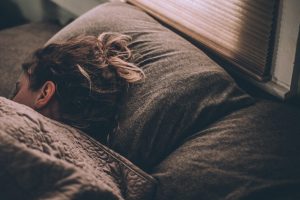How to fall asleep faster and sleep better
 Get help sleeping
Get help sleeping
We all have evenings when we find it hard to fall asleep or we wake up in the night. For many of us, the coronavirus (COVID-19) outbreak may have affected our sleep too.
Good-quality sleep makes a big difference to how we feel, mentally and physically, so it’s important to get enough. Watch our video on simple tips for better sleep, with Colin Espie, professor of sleep medicine at the University of Oxford.
The advice you will find here is a good way to get you thinking about your sleep and what may be stopping you from sleeping well. We also have some simple steps you can take to make a change.
1. Get into a daily routine
All the changes we have been through may have made it harder to maintain a consistent routine, but having a regular sleeping pattern is really important for good sleep. If you can wake up, wind down and go to bed around the same time each day, it will really help. Avoid napping too, if possible. Remember, your sleep routine starts before you actually get into bed, so build in time every evening to wind down – and try to switch off from your tech. Things like reading, gentle stretches or meditation are a good way to unwind, and keeping chargers for your devices out of the bedroom can help you avoid absent-minded scrolling.
2. Manage your worries
Lots of us have had extra concerns or anxiety because of COVID-19, and these feelings can affect how easily you fall asleep and how well you sleep. There are things you can do in your day to help manage your worries, like talking to someone you trust and switching off from the news. If you often lie awake worrying, set aside time before bed to make a to-do list for the next day – this can be a good way to put your mind at rest. Using techniques like reframing unhelpful thoughts might also help.
3. Prepare your body for sleep
Our physical health and how we look after our body can have a big effect on our sleep. It can be easy to fall into unhealthy patterns of behaviour that can make your sleep worse, especially at times like these. Having caffeine, alcohol, nicotine or a big meal too close to bedtime can stop you falling asleep and prevent deep sleep. Try to avoid them before bed and see if things improve.
Regular exercise is also great for sleep. Just remember to steer clear of anything too vigorous right before bedtime if you find it affects your sleep, and make sure you follow the social distancing guidelines when exercising.
4. Create a restful environment
Simple things can have a big impact when it comes to falling asleep and staying asleep. It’s generally easier to drop off when it’s cool, dark and quiet – but the right sleep environment is personal, so try different things and see what works for you. Wearing earplugs, putting your phone on silent and face down (or out of the room entirely), keeping clocks out of view and making sure the room is well ventilated can all make a big difference. Some people also find playing ambient sounds like rainfall, gentle music or white noise helpful.
5. Confront sleeplessness
If you’re lying awake unable to sleep, do no not try to force it. If you’re tired and enjoying the feeling of resting, then sleep may naturally take over. But if not, get up and do something relaxing for a bit, like reading a book or listening to quiet music, and go back to bed when you feel sleepier.

